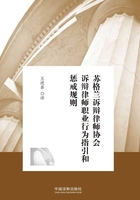
6.5 The Duty to Attend Court
6.5.1 It is the duty of an Advocate so to arrange his affairs as to avoid a foreseeable clash of commitments.
6.5.2 Having accepted instructions to appear, it is the Advocate’s responsibility to ensure, unless(in a civil case only)other arrangements have been made with the instructing solicitor, that he is present in Court on the day and at the time appointed and thereafter during the period of time for which he has been properly instructed until the trial or hearing is concluded.Where unforeseen circumstances make it impossible for him to be present, he must ensure that someone else is present at or before the time appointed to explain his absence and, if necessary, to move for an adjournment.
6.5.3 If an Advocate has accepted instructions to appear in the High Court or the Inner House, including instructions for the Single Bills, it is his duty to ensure that he is present there at the appointed time, even although he also has instructions to appear in the Outer House.If a clash of commitments appears likely, he should ensure that someone else is present to appear in the Outer House in his place and, if necessary, to move for an adjournment until he is free to appear there.If a conflict arises due to unforeseen circumstances and he finds himself still detained in the Outer House when he must appear in the High Court or the Inner House, he should inform the Lord Ordinary that he requires to go to the High Court or the Inner House as the case may be and ask for an adjournment so that he can do so.
6.5.4 It is acceptable but not obligatory for Counsel to accept instruction for the Motion Roll on a day when he is engaged in a proof or other substantial hearing in the Outer House.If Counsel engaged in a proof or other hearing in the Outer House expects to be in difficulty because he has accepted instructions to attend elsewhere in the Outer House to deal with an important matter on the Motion Roll on the same day, he or his clerk should inform the Clerk of Court as soon as possible so that the judge concerned may be alerted to the problem and take such action as is appropriate.It has been accepted that in such circumstances the start of the proof might reasonably be delayed until Counsel’s business in the other Court has been completed.
6.5.5 Senior Counsel appearing with junior should only be absent from the Court if he is satisfied that his junior will be present and will be able to deal properly with any matter which may arise.
6.5.6 For the reasons mentioned in paragraph 1.2.3 above, only the agent can “represent” the client in Court.Moreover, it may be necessary at any time for the Advocate to take instructions which he cannot properly do in the absence of the agent(see paragraphs 4.5 and 4.6 above).The Advocate is not responsible for ensuring the attendance of his instructing agent and is entitled, but never bound, to proceed with the case in the agent’s absence if the Court permits him to do so.He must, however, be satisfied (a)that the absence of the agent does not imply that his instructions have been withdrawn, and (b)that he can, consistently with his duty to the client and the Court, conduct the case properly in the absence of the agent.